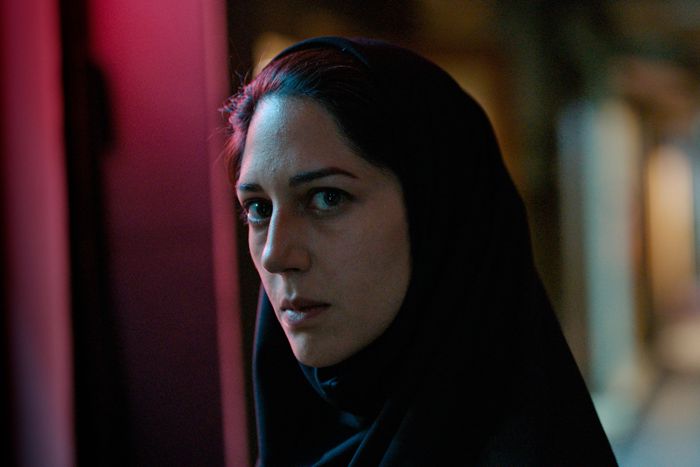
When Ryan Murphy’s Jeffrey Dahmer series premiered last month, it was met with a firestorm of criticism about how its supposedly victim-centered storytelling still managed to romanticize the serial killer while subjecting the surviving family members of those killed to renewed trauma. It’s also turned out to be one of the most-watched series Netflix has ever made — what can you do? True crime can be given a gloss of prestige, can approach its subject from new and different angles, and can reach for bigger themes, but there’s a kernel of prurience to the genre that’s never going to go away. Getting to gawk at violence, a very human if not especially flattering impulse, is the selling point of these stories, not something that can be easily extracted and left out, no matter what messaging the creators might tout.
Holy Spider is true crime in the guise of an art-house film, which makes it unusually squirrelly in its attempts to be about something more while also delivering lurid spectacle. It nevertheless gets to the goods pretty quickly, showing woman after woman being picked up from the streets of the Iranian city of Mashhad, brought back to the killer’s apartment, and then strangled to death by hand or with their own headscarf. The killer responsible, a construction worker named Saeed Hanaei, went on a yearlong killing spree that began in the summer of 2000 and that was aimed at sex workers, especially those who used drugs. Hanaei was the subject of a documentary that came out in 2002, the year he was executed by hanging, and has more recently inspired two scripted films, one of which, Ebrahim Irajzad’s 2020 Killer Spider, was shot in Iran with government approval. Holy Spider is the other, and it filmed in Jordan with the added liberties that allows, including a lead actor — Zar Amir Ebrahimi — who fled Iran in 2008 and a framing that explicitly links the murders to societal and religious misogyny. As a concept, it’s urgent and timely, but the execution is so muddled that the movie feels entirely defanged.
Holy Spider is the third feature from Ali Abbasi, a Denmark-based Iranian filmmaker whose last movie, the 2018 contemporary fantasy Border, attracted international attention and won the Un Certain Regard prize at Cannes. Border, about an adopted troll raised as a human, was beguiling, funny, and gratifyingly queer in its sensibility but also half-baked as allegory, intended or not, for extremism. Holy Spider builds only on the latter as a dour statement on patriarchal oppression that can’t be bothered to do much by way of delving into the interiority of the women it treats as fodder. Ebrahimi is cast as a fictional character — Rahimi, a crack journalist who arrives from Tehran to cover the killings and who links up with a semi-trustworthy local colleague, a crime reporter named Sharifi (Arash Ashtiani). Ebrahimi is a compelling presence with a ferocious gaze, but Rahimi is noticeably a construct, a cosmopolitan woman reluctantly adapting to a more restrictive city and a professional whose background is defined only by a case of sexual harassment, which she was fired for reporting. She serves as a de facto detective in the story, doing what the police don’t seem inclined to. But more than anything, she’s there as a counterweight to Holy Spider’s actual obsession, which is Saeed.
Played by Mehdi Bajestani, the killer commands half the movie, which dwells on his marriage to the supportive Fatima (Forouzan Jamshidnejad), his identity as a veteran of the Iran-Iraq war, his longing for martyrdom, and his role as a devoted father to their two young daughters and as a slightly sterner figure to his adoring son Ali (Mesbah Taleb). Holy Spider wants to see Saeed as a monster created by the society he was born into, a walking contradiction with a seemingly idyllic homelife and a gruesome hobby. But he’s not actually that interesting, instead coming across as nothing more than a true-crime stock figure — the seemingly normal family man whose placid exterior hides murderous impulses. It’s really only in its final act that the film begins to reckon with what it should have started with: the reactions from the religious conservatives who salute Saeed as a hero for cleaning up the streets and insist he did nothing wrong in murdering “corrupt” women. But like any true-crime story worth its salt, Holy Spider’s real interest is in the killings themselves, shot up close so that the reddened faces of the victims and their kicking feet can be fully appreciated. It’s not the first film to try to disguise its titillation at violence, in particular against women, with blunt, larger themes. But when those themes are about the structures that enable that violence, the whole enterprise just feels repellent.
More From This Series
- The Thriller Drop Is a Perfect Addition to the Bad-First-Date Canon
- The Accountant 2 Can Not Be Taken Seriously
- Another Simple Favor Is So Fun, Until It Gets So Dumb


